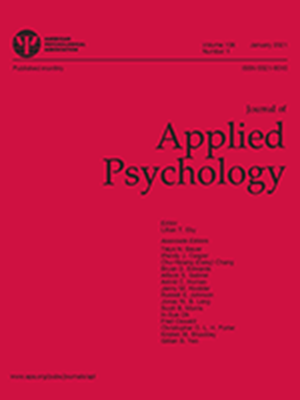I need a vacation: A meta-analysis of vacation and employee well-being.
IF 6.1
1区 心理学
Q1 MANAGEMENT
引用次数: 0
Abstract
Previous meta-analytic research concluded that the well-being benefits of vacation are small and fade away quickly, suggesting that vacation may not be that effective of a recovery opportunity for improving employee well-being. Since the time of this initial meta-analysis, however, the number of vacation studies has increased, providing an opportunity to estimate more precise meta-analytic estimates and increase our understanding of the different factors that play a role in this vacation-well-being relationship. As such, we conduct a meta-analysis using 32 studies that include 256 effect sizes to examine how employee well-being levels change due to vacation. Our results reveal that vacation has a large effect on well-being that does not fade out as quickly as previously thought. In terms of moderators, our results suggest that vacation length, national culture, and number of nationally mandated vacation days moderate this relationship, but the role of vacation location (i.e., away from home, at home, or a mix of both) remains unclear. Finally, we examine how types of activities and specific recovery experiences during vacation correlate with well-being during and after vacation using a meta-analysis of eight studies that include 69 effect sizes. Our findings suggest that psychological detachment and physical activities during vacation may be the most beneficial for improving employee well-being. Overall, this meta-analysis provides evidence that vacation is a more effective recovery opportunity for improving employee well-being than previous work suggests. (PsycInfo Database Record (c) 2025 APA, all rights reserved).我需要休假:休假与员工幸福感的元分析。
先前的元分析研究得出结论,假期对幸福感的好处很小,而且很快就会消失,这表明假期可能不是一个有效的恢复机会,可以提高员工的幸福感。然而,从最初的元分析开始,假期研究的数量增加了,这为估计更精确的元分析估计提供了机会,并增加了我们对在假期-幸福感关系中发挥作用的不同因素的理解。因此,我们对32项研究进行了荟萃分析,其中包括256个效应量,以检验员工的幸福感水平如何因假期而变化。我们的研究结果表明,假期对幸福感有很大的影响,而且这种影响并不像之前认为的那样迅速消失。在调节因素方面,我们的结果表明,假期长度、国家文化和国家规定的假期天数调节了这种关系,但度假地点(即离家、在家或两者混合)的作用仍不清楚。最后,我们利用包含69个效应值的8项研究的荟萃分析,研究了度假期间的活动类型和具体的恢复体验与度假期间和度假后的幸福感之间的关系。我们的研究结果表明,假期期间的心理超然和体育活动可能最有利于提高员工的幸福感。总的来说,这个荟萃分析提供了证据,证明假期是一个更有效的恢复机会,可以提高员工的幸福感。(PsycInfo Database Record (c) 2025 APA,版权所有)。
本文章由计算机程序翻译,如有差异,请以英文原文为准。
求助全文
约1分钟内获得全文
求助全文
来源期刊

Journal of Applied Psychology
Multiple-
CiteScore
17.60
自引率
6.10%
发文量
175
期刊介绍:
The Journal of Applied Psychology® focuses on publishing original investigations that contribute new knowledge and understanding to fields of applied psychology (excluding clinical and applied experimental or human factors, which are better suited for other APA journals). The journal primarily considers empirical and theoretical investigations that enhance understanding of cognitive, motivational, affective, and behavioral psychological phenomena in work and organizational settings. These phenomena can occur at individual, group, organizational, or cultural levels, and in various work settings such as business, education, training, health, service, government, or military institutions. The journal welcomes submissions from both public and private sector organizations, for-profit or nonprofit. It publishes several types of articles, including:
1.Rigorously conducted empirical investigations that expand conceptual understanding (original investigations or meta-analyses).
2.Theory development articles and integrative conceptual reviews that synthesize literature and generate new theories on psychological phenomena to stimulate novel research.
3.Rigorously conducted qualitative research on phenomena that are challenging to capture with quantitative methods or require inductive theory building.
 求助内容:
求助内容: 应助结果提醒方式:
应助结果提醒方式:


